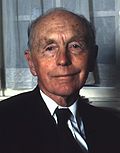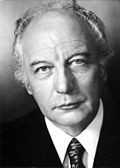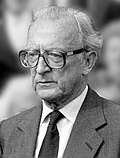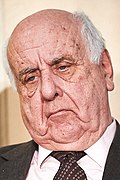User:ATX-NL/sandbox
This is a list of the oldest living members of the States General of the Netherlands. It includes those of the House of Representatives and the Senate. It is divided up of members who are at-least 90-years old.
Oldest living members of the States General of the Netherlands
[edit]| № | Name | Born | Party | House of Representatives tenure |
Senate tenure |
Combined tenure |
Source |
|---|---|---|---|---|---|---|---|
| 1 | Johan van Hulst | 28 January 1911 | Christian Democratic Appeal (Christian Historical Union) |
3 July 1956 – 10 June 1981 (24 years, 342 days) |
[1] | ||
| 2 | Anne Vermeer | 12 December 1916 | Labour Party | 3 July 1956 – 5 June 1963 (6 years, 337 days) |
20 September 1966 – 23 June 1987 (20 years, 276 days) |
27 years, 89 days | [2] |
| 3 | Lies Uijterwaal-Cox | 30 September 1920 | Christian Democratic Appeal | 10 February 1981 – 23 June 1987 (6 years, 133 days) |
[3] | ||
| 4 | Johan Witteveen | 12 June 1921 | People's Party for Freedom and Democracy | 5 June 1963 – 24 July 1963 (49 days) 21 September 1965 – 5 April 1967 (1 year, 196 days) |
8 June 1971 – 1 September 1973 (2 years, 85 days) 23 December 1958 – 5 June 1963 (4 years, 164 days) |
8 years, 116 days | [4][5] |
| 5 | Bart Hofman | 7 August 1921 | People's Party for Freedom and Democracy | 21 September 1982 – 23 June 1987 (4 years, 275 days) |
[6] | ||
| 6 | Els Veder-Smit | 29 August 1921 | People's Party for Freedom and Democracy | 23 February 1967 – 3 January 1978 (10 years, 314 days) |
25 August 1981 – 11 June 1991 (9 years, 290 days) |
20 years, 239 days | [7] |
| 7 | Hanske Evenhuis-van Essen | 30 October 1921 | Christian Democratic Appeal (Christian Historical Union) |
8 June 1977 – 3 June 1986 (8 years, 360 days) |
[8] | ||
| 8 | Ton van Baars | 6 March 1922 | Christian Democratic Appeal (Catholic People's Party) |
15 April 1980 – 10 June 1981 (1 year, 56 days) 19 January 1982 – 3 June 1986 (4 years, 135 days) |
5 years, 191 days | [9] | |
| 9 | Jan Reehorst | 21 March 1923 | Labour Party | 23 October 1956 – 21 February 1967 (10 years, 121 days) |
[10] | ||
| 10 | Govert van Tets | 11 September 1924 | People's Party for Freedom and Democracy | 20 September 1977 – 23 June 1987 (9 years, 276 days) |
[11] | ||
| 11 | Durk van der Mei | 13 October 1924 | Christian Democratic Appeal (Christian Historical Union) |
6 November 1956 – 10 May 1971 (14 years, 185 days) 3 August 1971 – 28 December 1977 (6 years, 147 days) 15 September 1981 – 16 September 1981 (1 year, 1 day) 11 November 1982 – 26 June 1984 (1 year, 228 days) |
24 years, 38 days | [12] | |
| 12 | Til Gardeniers-Berendsen | 18 February 1925 | Christian Democratic Appeal (Catholic People's Party) |
11 May 1971 – 19 December 1977 (6 years, 222 days) 10 June 1981 – 9 September 1981 (91 days) 21 June 1982 – 23 February 1983 (247 days) |
7 years, 195 days | [13] | |
| 13 | Johan Visser | 28 October 1925 | Labour Party | 5 March 1968 – 10 May 1971 (3 years, 66 days) |
[14] |
References
[edit]- ^ (in Dutch) Dr. J.W. (Johan) van Hulst Parlement & Politiek
- ^ (in Dutch) Drs. A.R. (Anne) Vermeer Parlement & Politiek
- ^ (in Dutch) E.L.M. (Lies) Uijterwaal-Cox Parlement & Politiek
- ^ (in Dutch) Dr. H.J. (Johan) Witteveen Parlement & Politiek
- ^ Laurens Kok en Jan Hoedeman (17 September 2017). "'Staatsschuld hoeft helemaal niet te worden afgelost'" (in Dutch). Algemeen Dagblad. Retrieved 10 December 2017.
- ^ (in Dutch) Dr. B. (Bart) Hofman Parlement & Politiek
- ^ (in Dutch) Mr. E. (Els) Veder-Smit Parlement & Politiek
- ^ (in Dutch) C.H. (Hanske) Evenhuis-van Essen Parlement & Politiek
- ^ (in Dutch) Drs. A.W.B. (Ton) van Baars Parlement & Politiek
- ^ (in Dutch) J. (Jan) Reehorst Parlement & Politiek
- ^ (in Dutch) Jhr.Mr. G.O.J. (Govert) van Tets Parlement & Politiek
- ^ (in Dutch) Drs. D.F. (Durk) van der Mei Parlement & Politiek
- ^ (in Dutch) M.H.M.F. (Til) Gardeniers-Berendsen Parlement & Politiek
- ^ (in Dutch) Ir. J. (Johan) Visser Parlement & Politiek
External links
[edit]- Official
- (in English) Deputy Prime Minister of the Netherlands Government of the Netherlands
- Prince Bernhard of Lippe-Biesterfeld, Prince consort of the Netherlands (1948–80) – (1954–75) [2]
- Alec Douglas-Home, Baron Home of the Hirsel (1977–80)[2]
- Walter Scheel (1981–85)[3][4]
- Eric Roll, Baron Roll of Ipsden (1986–89)[5]
- Peter Carington, 6th Baron Carrington (1990–98)[6][7]
- Étienne Davignon, Viscount Davignon (1999–2011)[8][9][10]
- Henri de Castries (since 2012)[11]
==
[edit]Jaap de Hoop Scheffer | |
|---|---|
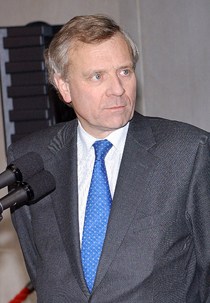 Jaap de Hoop Scheffer in 2004 | |
| 11th Secretary General of NATO | |
| In office 1 January 2004 – 1 August 2009 | |
| Preceded by | George Robertson |
| Succeeded by | Anders Fogh Rasmussen |
| Minister of Foreign Affairs of the Netherlands | |
| In office 22 July 2002 – 3 December 2003 | |
| Prime Minister | Jan Peter Balkenende |
| Preceded by | Jozias van Aartsen |
| Succeeded by | Ben Bot |
| Leader of the Christian Democratic Appeal | |
| In office 27 March 1997 – 1 October 2001 | |
| Preceded by | Enneüs Heerma |
| Succeeded by | Jan Peter Balkenende |
| Parliamentary leader of the Christian Democratic Appeal in the House of Representatives of the Netherlands | |
| In office 27 March 1997 – 1 October 2001 | |
| Preceded by | Enneüs Heerma |
| Succeeded by | Jan Peter Balkenende |
| Member of the House of Representatives of the Netherlands | |
| In office 3 June 1986 – 22 July 2002 | |
| Personal details | |
| Born | Jakob Gijsbert de Hoop Scheffer 3 April 1948 Amsterdam, Netherlands |
| Political party | Christian Democratic Appeal (from 1982) |
| Other political affiliations | Democrats 66 (1979–1982) |
| Spouse |
Jeannine van Oorschot
(m. 1974) |
| Children | Caroline de Hoop Scheffer (born 1980) Stephanie de Hoop Scheffer (born 1982) |
| Residence(s) | The Hague, Netherlands |
| Alma mater | Leiden University (Bachelor of Laws, Master of Laws) |
| Occupation | Politician Diplomat Civil servant Professor |
| Military service | |
| Allegiance | The Netherlands |
| Branch/service | Royal Netherlands Air Force |
| Years of service | 1974–1976 |
| Rank | |
| Battles/wars | Cold War |
Jakob Gijsbert "Jaap" de Hoop Scheffer ([ˈjaːb də ˈɦoːp ˈsxɛfər] ⓘ;[12] born 3 April 1948) is a retired Dutch politician and
of the Christian Democratic Appeal (CDA). He served as the 11th Secretary General of NATO from 5 January 2004 until 1 August 2009.[13]
He previously served as a Member of the House of Representatives from 3 June 1986 until 23 May 2002, and became the Parliamentary leader of the Christian Democratic Appeal in the House of Representatives of the Netherlands and CDA Party leader on 27 March 1997 after Enneüs Heerma stepped down. He resigned his positions as Parliamentary leader and CDA Party leader, after an internal power struggle, between him and then CDA Party Chair Marnix van Rij on 1 October 2001, and was succeed him in both positions by Jan Peter Balkenende who became Prime Minister of the Netherlands after the Dutch general election of 2002, with De Hoop Scheffer becoming Minister of Foreign Affairs in the new Cabinet Balkenende I, and continued serving in the Cabinet Balkenende II. He was an important figure in the Dutch decision to participate in the 2003 invasion of Iraq. He resigned as Minister of Foreign Affairs on 3 December 2003, when he was selected as the next Secretary General of NATO, he served as Secretary General from 5 January 2004 until 1 August 2009.
After his term as Secretary General of NATO ended, De Hoop Scheffer became a professor at the Leiden University sitting in the Pieter Kooijmans Chair. He also teaches at Leiden University College.
Life and career
[edit]Born in Amsterdam, De Hoop Scheffer graduated with an LL.M. degree at Leiden University in 1974. After completing military service in the air force, where he became a reserve officer, he worked for the ministry of foreign affairs from 1976 to 1986. For the first two years, he was stationed at the Dutch embassy in Ghana. After that, he worked at the Dutch delegation at NATO headquarters in Brussels until 1980.
Although he had been a member of the D66 party, he became a member of the Christen-Democratisch Appèl (CDA) in 1982. At the elections of 1986, he was elected to the House of Representatives. He was a spokesman on foreign policy for his party. Between 1997 and 2001, he was the leader of the CDA delegation in the House of Representatives, at a time when the CDA was in opposition. This made him the party leader.
When the list of candidates for the 2002 elections was chosen, his position as the party leader of the CDA became uncertain. After a power struggle with the party chairman Van Rij, De Hoop Scheffer resigned as party leader. Jan Peter Balkenende succeeded him, and had the top spot on the CDA list of candidates in the elections on 15 May 2002.
Foreign Minister
[edit]The CDA won in those elections and played the leading role in the formation of a new coalition government. The new prime minister Balkenende appointed De Hoop Scheffer as foreign minister in his short-lived first cabinet, a position he retained in the second Balkenende cabinet after the elections of 22 January 2003. In 2003, the foreign policy of the Netherlands was largely determined by De Hoop Scheffer and Balkenende. Its main foreign policy decision was to contribute to Operation Iraqi Freedom, although its formulation ("political" but not "military" support) gave it an ambivalent character. However, 1,100 Dutch servicemen were deployed as part of the Stabilisation Force Iraq in the southern province of Al Muthanna from 2003 till 2005, and two of them were killed in action.
In 2003 Jaap de Hoop Scheffer was also the Chairman-in-Office of the Organization for Security and Co-operation in Europe.
NATO Secretary General
[edit]
He became the 11th NATO Secretary General on 5 January 2004, succeeding Lord Robertson, who held the post from 1999 until 2003. The announcement was made on 22 September 2003.[14] As Secretary General, De Hoop Scheffer urged NATO members to contribute more to NATO operations such as the International Security Assistance Force in Afghanistan.[15] He "informed a NATO conference that 'NATO troops have to guard pipelines that transport oil and gas that is directed for the West,' and more generally to protect sea routes used by tankers and other 'crucial infrastructure' of the energy system".[16]
Jaap de Hoop Scheffer attended an economic conference in Montreal, Canada, on 21 June 2007, where he encouraged Canada to continue its military mission in Afghanistan past its 2009 withdrawal date. He said, "I think more time is necessary to create those conditions for reconstruction and development to go on."[17] His visit coincided with the death of three more Canadian soldiers in Afghanistan. "I know how dramatic it is if Canadian soldiers pay the highest price, but I still say, you are there for a good cause."[18] De Hoop Scheffer's comments were made as the Canadian government was under pressure by opposition politicians to define the length of Canada's commitment to the mission in Afghanistan.
On 21 July 2009 De Hoop Scheffer suffered a heart attack. He underwent angioplasty after which he was reported to be in stable condition.[19][20]
His successor, Anders Fogh Rasmussen, took office on 1 August 2009.
Other activities
[edit]On 1 September 2009 De Hoop Scheffer was appointed to the Pieter Kooijmans Chair for Peace, Law and Security at Leiden University. The appointment is part-time, and the holder of this chair is appointed for a maximum of three years.
In addition, De Hoop Scheffer has held a variety of honorary positions, including:
- Bahrain Center for Strategic, International and Energy Studies (DERASAT), Member of the International Advisory Board[21]
Controversy
[edit]It has been alleged by Iran that Jaap de Hoop Scheffer has met Jundallah leader Abdolmalek Rigi while he was visiting Afghanistan in 2008 as NATO secretary general amid Iranian and some western press accusations that CIA is backing the terrorist group. This accusation was later denied by NATO.[22]
Honours and awards
[edit] Knight of the Order of Orange-Nassau (Netherlands, 22 May 2002)
Knight of the Order of Orange-Nassau (Netherlands, 22 May 2002) Officer of the Order of Orange-Nassau (Netherlands, 12 December 2003)
Officer of the Order of Orange-Nassau (Netherlands, 12 December 2003) Knight Grand Cross of the Order of Orange-Nassau (Netherlands, 6 July 2009, for his services as Secretary General of NATO)[23][24]
Knight Grand Cross of the Order of Orange-Nassau (Netherlands, 6 July 2009, for his services as Secretary General of NATO)[23][24] Order of the Balkan Mountains, First Class (Bulgaria, 2009)
Order of the Balkan Mountains, First Class (Bulgaria, 2009) Grand Order of King Tomislav (Croatia, 5 February 2009, "for outstanding contribution to strengthening the international position of the Republic of Croatia and the promotion of cooperation between NATO and the Republic of Croatia")
Grand Order of King Tomislav (Croatia, 5 February 2009, "for outstanding contribution to strengthening the international position of the Republic of Croatia and the promotion of cooperation between NATO and the Republic of Croatia") Grand Cross of the Order of the Cross of Terra Mariana (Estonia, 6 July 2009)
Grand Cross of the Order of the Cross of Terra Mariana (Estonia, 6 July 2009) Grand Cross of the Order of Merit of the Italian Republic (Italy, 16 February 2009)
Grand Cross of the Order of Merit of the Italian Republic (Italy, 16 February 2009) Grand Officer of the Order of the Three Stars (Latvia, November 2004, for his commitment to a United Europe)
Grand Officer of the Order of the Three Stars (Latvia, November 2004, for his commitment to a United Europe) Grand Cross of the Order of Vytautas the Great (Lithuania, 26 June 2009)[25]
Grand Cross of the Order of Vytautas the Great (Lithuania, 26 June 2009)[25] Grand Cross of the Order of Merit of the Republic of Poland (Poland, 12 March 2009)
Grand Cross of the Order of Merit of the Republic of Poland (Poland, 12 March 2009) Grand Cross of the Order of the Star of Romania (Romania, 10 May 2004)[26]
Grand Cross of the Order of the Star of Romania (Romania, 10 May 2004)[26] Order of the White Double Cross, First Class (Slovakia, 2009)[27]
Order of the White Double Cross, First Class (Slovakia, 2009)[27] Order for Exceptional Merits (Slovenia, 2009)[28]
Order for Exceptional Merits (Slovenia, 2009)[28] Honorary Knight Commander of the Order of St Michael and St George (United Kingdom, 10 February 2010, for his services to NATO)[29]
Honorary Knight Commander of the Order of St Michael and St George (United Kingdom, 10 February 2010, for his services to NATO)[29]
References
[edit]- ^ Laurens Kok en Jan Hoedeman (17 September 2017). "'Staatsschuld hoeft helemaal niet te worden afgelost'". Algemeen Dagblad (in Dutch). Retrieved 10 December 2017.
{{cite news}}: line feed character in|work=at position 19 (help) - ^ a b "Twenty-fifth Bilderberg meeting held in St joseph MO". Facts on File World News Digest. 14 May 1977.
- ^ "Bilderberg Meetings Conference Report 1981".
- ^ "Bilderberg Meetings Conference Report 1985".
- ^ Who's Who. 1999.
- ^ Cite error: The named reference
rockefellerwas invoked but never defined (see the help page). - ^ "Bilderberg Meetings Conference Report 1990".
- ^ Cite error: The named reference
bbc05was invoked but never defined (see the help page). - ^ "Booklet of the 1999 annual conference". Schnews.
- ^ "Final List of Participants of the 2011 Bilderberg annual conference". Official website.
- ^ "Final List of Participants of the 2012 Bilderberg annual conference". Bilderberg Meetings.
- ^ The first word in isolation: [ˈjaːp].
- ^ NATO - Biography Jaap de Hoop Scheffer
- ^ "New Secretary General takes up office". NATO. 7 January 2004.
- ^ "Nato boss pleads for Afghan focus". BBC. 19 June 2004.
- ^ Chomsky, Noam (2011-04-21) Is the world too big to fail?, Salon.com
- ^ "Canada should stay in Afghanistan past 2009, NATO chief says". CBC News. 21 June 2007.
- ^ "Canada should stay in Afghanistan past 2009, NATO chief says". CBC News. 21 June 2007.
- ^ [1]
- ^ [2]
- ^ International Advisory Board Bahrain Center for Strategic, International and Energy Studies (DERASAT), Manama.
- ^ Spencer, Richard; Osborn, Andrew; Waterfield, Bruno (23 February 2010). "Iran arrests most wanted man after police board civilian flight". The Daily Telegraph. London.
- ^ Hoge onderscheiding voor De Hoop Scheffer - online de Volkskrant (Dutch)
- ^ Ridder Grootkruis in de Orde van Oranje Nassau voor De Hoop Scheffer Website Ministry of General Affairs (Dutch)
- ^ Lithuanian Presidency, Lithuanian Orders searching form
- ^ Decretul 301 din 10 mai 2004 (Decretul 301/2004) - Decree from the Romanian president to award Jaap de Hoop Scheffer
- ^ Slovak republic website, State honours : 1st Class in 2009 (click on "Holders of the Order of the 1st Class White Double Cross" to see the holders' table)
- ^ stafoto
- ^ Hoge Britse ridderorde voor De Hoop Scheffer - Website www.nu.nl (Dutch)
==
[edit]Johan Wilhelm van Hulst (born 28 January 1911) is a retired Dutch politician of the defunct Christian Historical Union (CHU) now merged into the Christian Democratic Appeal (CDA).
He served as Member of the Senate from July 3, 1956 until June 10, 1981. He served as the Parliamentary leader of the Christian Historical Union in the Senate from December 10, 1968 until June 8, 1977 when the Christian Historical Union merged into the Christian Democratic Appeal, he became the first Parliamentary leader of the Christian Democratic Appeal in the Senate serving until June 10, 1981. He was a Member of the European Parliament for the Christian Democratic Group, from October 16, 1961 until September 30, 1968. Van Hulst was the Party chair of the Christian Historical Union from September 13, 1969 until February 19, 1972.
Van Hulst is an emeritus professor of Pedagogy at the Vrije Universiteit in Amsterdam and the highly prolific author of more than one hundred publications. He is also a chess player. In 1943 he was responsible for rescuing hundreds of Jewish babies and children from the nursery of the Hollandsche Schouwburg in Amsterdam before they were deported. For his humanitarian actions he received the Yad Vashem Distinction as a Righteous Among the Nations from the State of Israel on 8 March 1972.
Early life
[edit]Van Hulst was born on January 28, 1911 in Amsterdam. He studied psychology and pedagogy at the Vrije Universiteit in Amsterdam. In the meanwhile he also worked as a teacher and mentor in the cities Oudewater, Utrecht and Purmerend. From 1942 until 1960 he was Principal of the Pedagogical Academy in Amsterdam. In that capacity he was responsible for rescuing hundreds of Jewish babies and children from the nursery of the Hollandsche Schouwburg for which he received the Yad Vashem Distinction in 1973. He is the author of several publications.
Politics
[edit]Senate
[edit]Van Hulst has served as a politician at several levels. From 1956 until 1981 he was a member of the Dutch Senate. From 1961 until 1968 he was a member of the European Parliament and from 1969 until 1972 he was chairman of the Christian Historical Union (CHU). From 1972 until 1981 Van Hulst was group leader in the Senate of the Netherlands; first for the Christian Historical Union (CHU) and from 1977 on for the Christian Democratic Appeal (CDA).[1]
Chairman
[edit]Van Hulst was elected as Chairman of the Christian Historical Union on 5 October 1968 during the Christian Historical Union party conference of 1968. Van Hulst was tasked with preparing for the upcoming for the Dutch general election of 1971.
Personal
[edit]Van Hulst is also an active chess player. At the age of 95 he won the Corus Chess Tournament for (former) politicians. He won the tournament again in 2010.[2][3][4] On 28 January 2011 Van Hulst celebrated his 100th birthday. According to René van der Linden, the president of the Senate of the Netherlands, Van Hulst is the first former member of the Senate of the Netherlands to reach the age of 100 since the establishment of the upper house in 1815.[5]
References
[edit]- ^ (in Dutch) Parlement en Politiek Dr. J.W. (Johan) van Hulst
- ^ (in Dutch) schaaksite.nl Johan van Hulst (99 jaar) wint toernooi parlementariërs
- ^ Chess Vibes The endgame technique of a 99-year-old 3 March 2010
- ^ (in Dutch) Man Bijt Hond Max Euwe werd 75 jaar geleden wereldkampioen schaken 15 December 2010
- ^ (in Dutch) Eerste Kamer der Staten-Generaal Kamervoorzitter feliciteert honderdjarige oud-senator Van Hulst 28 January 2011
External links
[edit]- (in Dutch) Dr. J.W. (Johan) van Hulst Parlement & Politiek
- (in Dutch) Dr. J.W. van Hulst (CDA) Eerste Kamer der Staten-Generaal
- (in Dutch) Johan van Hulst Yad Vashem


